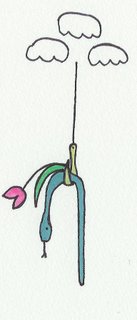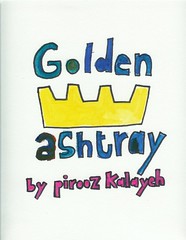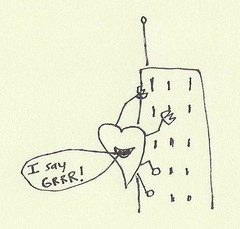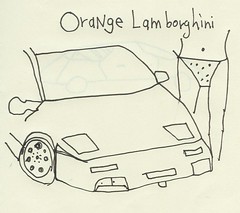
I do not know what is best. Take or leave what I have to say.
I believe in one thing as a teacher and that is freedom. To allow students a complete reign to pull and choose from anything they desire. What I hope to provide artists is a fertile and safe ground of discovery. The best method I have found for providing this foundation is by helping individuals lose the idea of a qualitative good and bad in their art.
How easy it is to stop a great idea or a magnificent poem or painting with thoughts like, this line is not good enough or I am not good enough? I know this, because there are times when I have suffered under this totalitarian regime. But, as with all absolutes, there are moments when one begins to see the frailty of the stories we tell ourselves. We question their validity, and, in turn, those questions lead to other possibilities.
In the case of "good and bad in art," it stands to reason that if one does not have such a filter, the work that will be created will be outside any particular standard or expectation, both within the artist, and in their respective communities.
On first contact, this idea is revolutionary. Many react with disgust. There may even be name-calling. This is to be expected. Some minds are very comfortable in chaos. They, in fact, see anything other than their own thinking as the very chaos from which they are a participant.
That is why it is important to offer the idea, and let the mind filter its own choice to participate or withdraw.
Some are very hungry for this possibility. They drink from the cup, and, in turn, bloom very readily. Others are not ready to bloom at all. They are as tight as a fist, and their reactions behave as the very thing they have become.
Now many of you may be reading this with curiousity. How is it possible to have no good or bad in art? We make judgments all the time. This is a very human thing. And I say, "Yes, I agree."
I make judgments all the time. This is what it is to be human. This is reality. Of course, the difference for me lies in perspective. If I am very close to an idea, then I cannot see that it is just an idea. I think that it is absolute, and expect others to behave accordingly. But if I move outside the realm of my concept, I begin to see the interplay between ideas, and in this kaliedoscope of possibility there is no good or bad.
Let me use an example.
Jimmy Smits loves Keith Haring. He thinks he is a fantastic artist. He spends all his moments upholding Keith to any other artist, and when other artists are placed before him, he uses Keith's effect on him as a gauge for the other art he views.
I may show him a William De Kooning painting, or Marcel Duchamp's Urinal, but no matter the validity of these other objects being art--all are seen as sub-par in comparison to Keith Haring.
The same can be said for poetry. Lets say Jimmy Smits loves Jack Spicer. No other poet matches his mastery in language. I can show him Frank O'Hara or Walt Whitman or even Allison Stine, but none of these poets can match the feeling Jimmy has in response to Spicer, and thus, these other poets are beneath his idol.
Now when Jimmy approaches his art he takes this idea with him. He holds a pen in one hand, and Jack Spicer in the other, and begins to write. He soon finds he is not Jack Spicer. He has a different mind. He is a different person. We know this, but Jimmy doesn't. He thinks he is a bad poet.

Pretty soon, Jimmy takes his anger and frustration into the world with him. He cannot be what he wants as a poet, and therefore points fingers and makes classifications of the world around him. He sees a poem by Ann Waldman or Ted Berrigan or maybe even Jack's good friend, Robin Blaser, and begins to see similarities in style. He may even begin to correspond these poets as being close to his idol, Jack Spicer.
This in Jimmy's mind is equatable to good. Anything that is like the feeling that Jack Spicer gave him is good, and he walks with this feeling into the new poetic realms he encounters.
Now something interesting happens. Jimmy has spent so much time searching for other artists that create a similar feeling like his idol, Jack Spicer, that he no longer connects in the same way to his original idol. Now he is a fan of Ferdinand de Saussure or Ludwig Wittgenstein, because he has found their discussions on language fascinating, and he hopes to uncover a semblance of what is good in his own writing, by understanding the philosophical arguments of logocentrics and the interplay between text.
This leads Jimmy down many more years of grappling to understand good and bad, and trying to exhibit in his writing.
During this time, he has put forth many poems. In all, there are many that imitate his idols (for now there are many besides Spicer). There are some that sound very close to his original, and these he prizes above all others.
"This is what's good," he says.
And others, also inclined within the duality of good and bad, and the taste for such an aesthetic, agree with him.
"Yes," they say. "We agree."
This only perpetuates one idea to Jimmy. Jack Spicer is good, and he is shit. This continues to hurt his creative prowess, and he unknowingly believes it is strengthened. This sense of approval from his contemporaries, allows himsel a false sense of fullness, and he carries this into his next poems, continuing with the voice in which he has found approval.
If Jimmy is lucky, he will stop one day in his early 60's, turn around, and find himself no longer interested in the voice that he has so long cherished. Maybe, it is the death of his life partner or wife. Maybe, it was simply a death inside him. But, for some reason, Jimmy does not care to write like Jack Spicer anymore. In fact, he has no interest to write like anyone.
He writes several volumes of poetry. These are all published rather quickly. He finds himself a bit of a celebrity. He is being celebrated as good. He, by not caring or upholding his idol, found the veritable truth. He was writing for himself and no one else, and thus gave rise to a new idea, that he did not know what good or bad was all those years before.
Now, maybe, he reads his new volumes, or even pens his latest poem, and finds himself crying uncontrollably. At first, this seems strange to him, until he realizes, that the old ideas in him have fallen away. He is new and fresh and original and himself. He is outside the realm of good or bad.
Now if Jimmy had let go of his idol sooner, or had been given more encouragement for the work that was his (the lines that were simple and elegant, and became his trademark) he would have lived a happier or more productive life. Maybe. Who knows? He could have also, at the end of this story, not have ever discovered his truth, and died still holding Jack Spicer's Collected Works to his chest.
The point is that holding onto good or bad is a choice. It might serve its purpose for you to continue to uphold one or another artist, or a collective of artists, or a school of thought above any other. This is your choice.
It may also anger you that I say, Let go of these ideas. Let go and hold onto your truth.

Although it may seem kind to some for me to help Jimmy perceive new possibilities, there are those who do not not see it as kind. They do not want to see with their own eyes, because they have been in the habit of looking with someone else's.
I hope those of you who are beginning to see good and bad fall away, allow yourselves the full experience that you may offer your eyes to the person seated next to you, but not before you see your reflection in the night sky.
May we all die quickly to the Infinite,
Pirooz Mahmood Kalayeh












6 comments:
I know your real, Burt. You're my best friend.
It's hard to leave somtimes.
How do you do it? Leaving for adventures all the time. How?
You make it sound so easy.
I love you, Burt. You are my favorite person.
My dad calls me champ.
Post a Comment